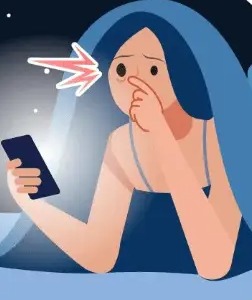Beware of Glaucoma from Using Your Phone in the Dark, Prolonged Pre-sleep Phone Usage May Make You “Uglier”
Ophthalmologists warn that using your phone in the dark is very harmful to your eyes. It can damage the cells that secrete tears, leading to symptoms such as dry eyes and fatigue. Clinically, many patients with acute angle-closure glaucoma have been triggered by long periods of phone use in the dark.

According to a previous report by the “Life and Health Newspaper” in Zhejiang, China, Mrs. Wang (a pseudonym) from Hangzhou’s West Lake District, who is healthy and youthful and keeps up with trends, including using short video platforms extensively. In recent years, Mrs. Wang has repeatedly experienced foggy vision and eye soreness, which would relieve after rest.
One weekend evening, as usual, Mrs. Wang was using her phone before sleep when she suddenly felt swelling and pain in her right eye, with a significant decline in vision, as if covered by a thick fog. The next day, her vision did not recover but worsened, and the pain persisted, accompanied by headaches on the right side, loss of appetite, and even nausea and vomiting. She rushed to Zhejiang Hospital and was diagnosed with an acute attack of primary angle-closure glaucoma in her right eye. The doctor informed her that using her phone in the dark every night could likely be the trigger for glaucoma.
Using Your Phone for 8 Minutes Before Bed Excites the Body for an Hour
A sleep assessment platform in the United States surveyed over 2,000 people’s sleep data and found that 78% of participants had revenge bedtime procrastination, requiring an average of 1 hour to fall asleep after using their phones. Revenge bedtime procrastination refers to delaying sleep to engage in unimportant activities, indicating a poor balance between work and life. The study discovered that exposure to blue light for about 8 minutes could keep the body excited for more than an hour, causing circadian rhythm disruption.
Moreover, the study pointed out that using your phone before bed could reduce the percentage of rapid eye movement (REM) sleep by 14%, and falling asleep takes at least 1 hour.
Normally, the eyes hardly move after falling asleep during the non-REM sleep phase. About an hour or an hour and a half later, the eyes start to move back and forth during the REM sleep phase, which lasts for 10-15 minutes.
Prolonged Pre-sleep Phone Use May Lead to “Ugliness”
Long-term close viewing of phone screens can lead to a decrease in ciliary muscle function, resulting in eye fatigue and blurred vision. People who like to use their phones in the dark are also likely to stimulate the macular area, possibly triggering diseases like glaucoma and age-related macular degeneration, which have high rates of blindness.
The blue light emitted from phone screens penetrates deeper into the skin than ultraviolet light, causing rough skin and enlarged pores. Additionally, blue light can darken the skin and accelerate aging. Therefore, prolonged pre-sleep phone use may lead to becoming “uglier.”
Furthermore, the blue light from phone screens can keep the brain in an excited state, preventing it from entering rest mode. Prolonged brain stimulation can significantly increase the likelihood of insomnia, frequent dreaming, and migraines.